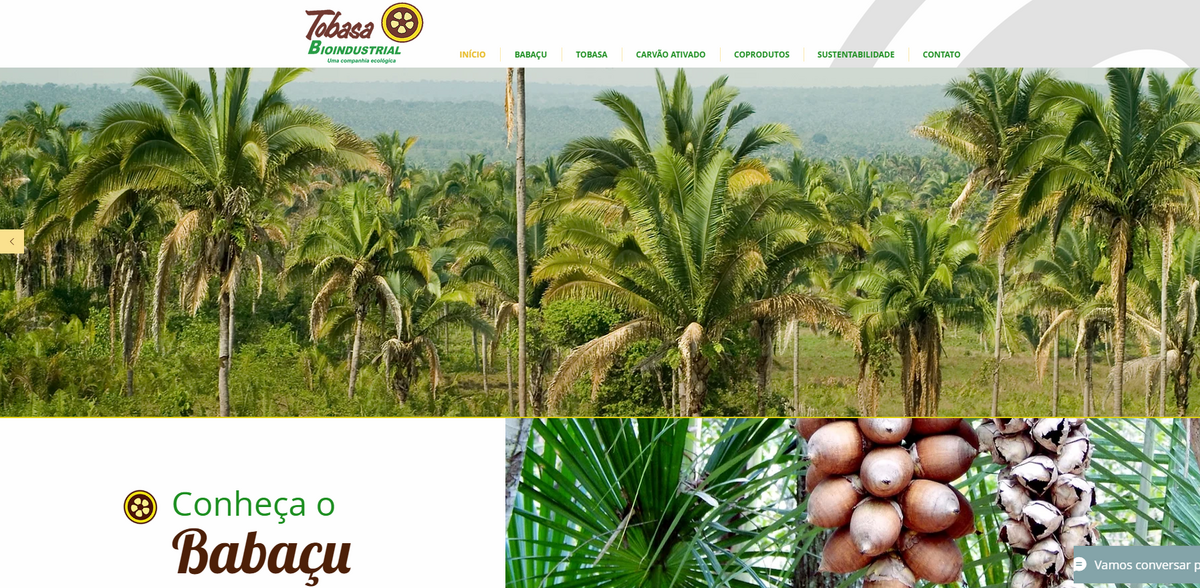What is TOBASA Bioindustry and Sustainability?
TOBASA – Bioindustry and Sustainability is a pioneering and innovative project located in the Legal Amazon, Tocantins state. The project is focused on the “Integral Use of Babaçu Coconut”—a strategy that taps into renewable energy markets and produces ecologically correct and sustainable products. These products include oil, protein cake, energy biomass, starch flours, amylaceous alcohol, and activated carbon. This initiative, operating within the Agricultural Processing industry, exhibits a BCorp score of 118.4, underscoring its commitment to balancing profitable growth with social and environmental impacts. It creates a compelling model where local biodiversity meets sustainable development, providing natural resources in an efficient and innovative way…
Main Benefits of the Project
The strength of TOBASA lies in its integral approach to using the babaçu coconut, a renewable resource with immense energy potential. By focusing on natural, high-quality raw materials, the project drives economic and ecological growth simultaneously. Key figures and facts include:
- Extraction and transformation of the babaçu coconut, native to the northern region of Brazil
- B Corp score of 118.4 – a testament to its sustainability practices
- Production of diverse eco-friendly products such as oil, activated carbon, and energy biomass
- Utilization of the endocarp from the babaçu coconut, known for its natural high hardness
- Support for multiple sectors: Hygiene and Cleaning, Agriculture, Biofuels, Chemical, Cosmetics, and Alcoholic Beverages
Integral Use of Babaçu Coconut and Its Value
The babaçu coconut, arising from a native palm tree in northern Brazil, covers extensive areas of forested lands and is a renewable resource with significant energy potential. The integral use of this coconut means that every part of it is transformed into valuable products. This approach not only maximizes resource efficiency but also minimizes waste, making it a stellar example of sustainable practice. It is intriguing to see how the natural characteristics of this resource are respected and harnessed to produce chemical products and renewable energy sources in a balanced, environmentally conscious manner… Efficiency and sustainability go hand in hand in this project.
Activated Carbon Production Excellence
In the realm of activated carbon production, TOBASA stands out by manufacturing this product using the endocarp of the babaçu coconut. This choice of raw material is deliberate—it is considered a noble material due to its natural high hardness, which results in a superior quality activated carbon. The process is both sustainable and ecologically correct, ensuring that the manufacturing respects the tropical ecosystem and contributes to cleaner production methods. The application of activated carbon spans various industries, proving how a single renewable resource can lead to products that impact everyday life and industrial practices positively…
Co-products and Their Industrial Applications
One of the fascinating aspects of the project is its commitment to the integral utilization of the babaçu coconut. This process generates important co-products that serve as raw materials for a wide array of industrial sectors. The project offers products that meet the needs of Hygiene and Cleaning, Agriculture, Biofuels, Chemical, Cosmetics, and Alcoholic Beverage industries. Each of these sectors benefits from the natural properties of the babaçu coconut, which provides not just ecological efficiency but also quality and sustainability. The use of diverse co-products exemplifies how integration in the production process can yield various applications that encourage innovation and a circular economy…
Project Impact and Sustainability Goals
- SDG 7 – Affordable and Clean Energy: The project contributes by providing sustainable energy biomass and biofuels.
- SDG 12 – Responsible Consumption and Production: Emphasizing the integral use of the babaçu coconut minimizes waste and promotes eco-friendly products.
- SDG 13 – Climate Action: By focusing on renewable resources and environmentally conscious processes, the project actively works towards climate action.
- SDG 15 – Life on Land: The initiative supports biodiversity and sustainable use of land through its mindful extractive processes.
Sustainable Future in the Agricultural Processing Industry
TOBASA – Bioindustry and Sustainability charts a new course in the Agricultural Processing industry, where natural resources are leveraged with precision and care to create products that matter—both economically and environmentally. The project not only illustrates the renewable potential of the babaçu coconut but also thrives on an ethos of respect for biodiversity and ecological balance. From the source in the Legal Amazon to the innovative production processes, every step is designed to yield products that sustain local economies and protect natural habitats. This initiative, with its integral approach and focus on multiple co-products, reinforces the idea that sustainable practices can drive significant industrial advancements. Conversations about environmental responsibility are increasingly important today, and projects like TOBASA demonstrate that well-planned and eco-conscious strategies can lead to a future where industrial progress does not come at the expense of nature. This concept resonates widely, proving that effective utilization of renewable resources, combined with innovative processes, paves the way for a greener, more sustainable world…


















